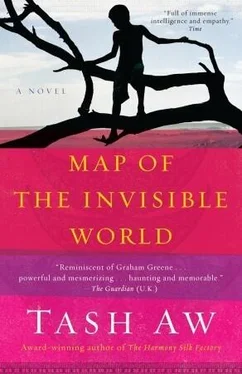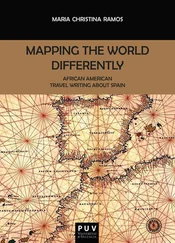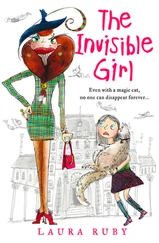(And I can also recognize Communists — they dress very badly because they are poor)
my father’s only crime is to have been born a foreigner
i searched the house for clues but found only pictures of you and my father you looked very happy
He recalled scrabbling around nervously among Karl’s papers, afraid he was transgressing some undefined boundary. The memory of Karl’s room — his small desk, his curling handwriting on sheets of paper, the smell of mothballs and old books — was clear and unwavering.
He looked up from his piece of paper. The radio crackled in and out of tune: “Indonesian paratroopers … landings in Malaysia … skirmishes with British forces … deaths … prelude to invasion. He thought he heard the front gate creak open but there had not been a car. He went to the window and looked out; there was no one in the yard, just a black-and-white cat with a broken tail licking itself in the shade of the potted plants. There was a scattering of dead leaves across the yard, and Adam noticed that most of the plants were parched, their foliage turning crinkled and crispy at the edges. It was never like this at home (one of Adam’s more important daily chores was to ensure that the plants were well watered). He returned to his list. There was a song on the radio, a keroncong tune with its frilly strings and sweetly sung melody. It was important that he concentrate, he told himself; he needed to provide Margaret with all the information he could so that she would help him. He was seized by a sharp sense of anxiety, one that he had experienced several times over the last few days, always accompanied by visions of Karl in a squalid prison cell that he shared with badly dressed Communists who would try and steal his shoes. There would be no food and very little water, and the water would be dirty and make Karl sick. Adam closed his eyes and rubbed his temples, which had begun to ache. He made a quick mental calculation: Karl had been missing for eleven days — not quite enough time to die from starvation, but certainly enough time to die from dehydration. A noise startled him, and when he opened his eyes there was a man in the room.
“Hello,” the man said, though it sounded more like a statement than a greeting. He was half-frowning but smiled, as if trying to hide displeasure. “Who are you?”
Adam did not move in his chair. He rested his hands lightly on his knees, wondering what he would do if the man lunged at him. He had managed to go a whole week without being accosted on his travels, and now, when he thought he was safe, he had let down his guard and allowed a stranger into Margaret’s house.
“Who are you?” Adam managed to say.
The man did not answer immediately but instead placed a package on the table. It was wrapped in newspaper and cinched with a rubber band. “I’ve brought something — it was for Margaret, but I guess she’s not at home.”
Adam stood up and backed away slightly.
“Don’t be afraid. My name is Din,” the man said, unwrapping the package to reveal a bunch of bananas, perfectly ripe. “I’m one of Margaret’s colleagues — well, I’m technically her student, but she doesn’t really supervise me. Here, have one. They’re very hard to find nowadays.” He tore off a single plump banana and held it out to Adam.
“I was just passing by — I tried the telephone but the lines are down. Happens a lot these days. The exchange is always a mess, what with the troubles on the streets.” He looked out the window as if expecting someone. “I hope Margaret is okay. There weren’t any classes today, everything’s been canceled, it’s a mess. Margaret normally comes in to the campus anyway, and when she didn’t, I got worried. She still cares about her students, even though they don’t actually do any studying anymore. She’s probably the only person in the world who still cares.”
“She seems very nice. I like her.”
“Are you a student too?”
“No,” Adam said, taking the banana. “Well, not a university student, if that’s what you mean. I’m too young. I’m not sure if I’ll go to university — my father hasn’t decided yet.”
“That’s a shame,” said Din, settling into an armchair facing Adam, “because education is the future of our country. So, who are you?”
Adam paused to consider his questioner, a small slight man dressed neatly in a short-sleeved shirt and cotton trousers with a crease running sharply down each leg. He would not be stronger than Adam if they got into a fight, Adam thought — not unless he was armed, which he did not appear to be. “My name is Adam de Willigen,” he said. “I am a friend of Margaret’s too.” As he said that he blushed and felt as if he had just told a lie.
“What kind of name is that? You’re making it up.”
“No, I’m not,” Adam said. There was something in Din’s face that irritated him: the nondescript features that took on an air of self-righteousness, the gently furrowed brow, the slim Sumatran nose — all these things suddenly became pronounced and dislikable.
“Did you give yourself that name? Why do you want to be Dutch , of all things? We should be breaking free from all that. Don’t you know anything? That is why we’ve been fighting for the last twenty years.”
“They were not all bad. And anyway my name is also that of my father, and he is as Indonesian as you are.”
Din smacked his forehead with his palm, just once, hard, and squeezed his eyes shut. Adam hoped that he had hurt himself. “Not another one of these self-deluding white people. I hope you don’t believe any nonsense he might have told you. It makes me so angry.”
Adam did not reply. If it had been his house he would have asked Din to leave.
“Okay, so you’re too young to be a university student,” Din continued, his voice dropping to adopt a more conciliatory tone, “but you must have some idea of the revolution that is going on. You don’t look like a stupid, uneducated boy. Listen, we Indonesians — I mean, real Indonesians — need to determine what is best for us. We have to forge a path to our destiny.”
“That is what my father tells me. Indonesia will decide what is best for itself.”
Din lifted his chin and half-laughed, half-sneered. “Listen to that. You don’t even believe it yourself. It means nothing — you’re just repeating what someone told you. ‘Decide what is best’? It seems your whole life has been determined by someone else. Some foreigner decides what you should do — go to university or not, eat or not, pray or not. We know what is best. What is best is to live in a world that is not controlled by the West for their unjust intentions. What is best is to have a future where Asian and African countries control their own destinies. For three hundred years, someone else has written our history books for us, but now we have to rewrite them.”
“I suppose so.”
Din pinched his own forearm. “Look — we have the same skin. Same color. I would not lie to you.”
Adam nodded. He realized that he had never heard another native Indonesian speak at length about anything other than the tide or the waves or the drought or the rice harvest. It felt odd to hear someone who looked like him talk in the same kind of language that Karl used, only with more urgency.
“Your father — okay, well, he’s not your father, but I can see why you call him that — I’m sure he’s a good person. But he cannot decide your future for you. He can no longer even decide what to do for himself — all the Dutch people are being sent back to Holland. What are you going to do? Go back to Holland with him?”
The music seemed louder, more shrill now, but Adam could not make out the words. He shrugged. “Yes, I suppose so.”
Читать дальше
Конец ознакомительного отрывка
Купить книгу












